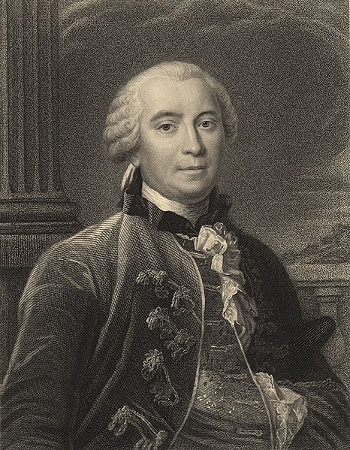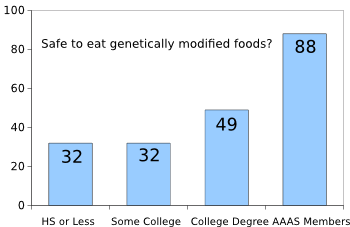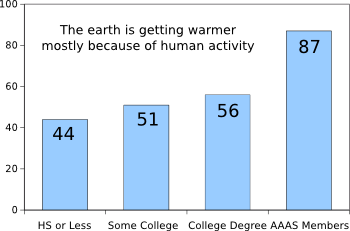Public Opinion on Science
July 30, 2015
Progress in
science has the
side effect that some "facts" learned by
scientists while they were in
college and
graduate school are changed over the course of their
careers. Many
universities have a policy that a
Ph.D. candidate must defend his/her
thesis within a certain period, typically seven to nine years. The reason for this is that their
competency has been diminished as their
field has progressed.
Successful scientists are
lifelong learners, reading
professional journals, attending
seminars and
conferences, and chatting with
colleagues. As an
industrial scientist, I was required to complete at least forty hours of "
professional development" each year, just as all other
employees of the
corporation were required to do. However, this was something I would necessarily have done without the requirement.
If it's that hard for a scientist to keep current, what hope is there for members of the
general public, many of whom have had just one or two science
courses in
high school or college? Even a practicing scientist has specialized knowledge of just one
scientific discipline; so, how do
physicists make informed
opinions on matters of
biotechnology, and
physiologists on matters of
nanotechnology?
The results of a recent
survey by the
Pew Research Center show a wide gap of opinion on
scientific matters between the general public and scientists.[1-3] In this survey, the scientists were members of the
American Association for the Advancement of Science (AAAS), an organization that encompasses all disciplines of science and is the
publisher of the prestigious
journal,
Science. I've been a member of the AAAS for more than thirty-five years, principally because I'm an
American scientist interested in the advancement of science, but also because I receive
Science as a
perquisite of membership.
The public seems less
educated in science today than in the past. As an example of past scientific
literacy, at about the time of the
American Revolution, the
Frenchman,
Georges-Louis Leclerc, Comte de Buffon (1707-1788), published volume after volume of a
natural history,
Histoire naturelle, a modern take on
Pliny's Naturalis Historia. It's written that this scientific work "was a best seller that was read by virtually every educated person in
Europe."[4].

Georges-Louis Leclerc, Comte de Buffon (1707-1788)
Buffon is better known to mathematicians and computer scientists for Buffon's needle, a statistical method for determining the value of the mathematical constant, pi.
(Via Wikimedia Commons.)
Says the Pew Research Center,
"There is a common supposition that when ordinary people have different views from those of experts that the differences center on knowledge gaps: If only people knew more, the argument goes, they would agree with the experts."[2]
We can see this
principle operating in three major scientific issues of the day, the
safety of
genetically modified foods,
biological evolution, and
global warming. As can be seen in the Pew survey results on the question of whether genetically modified foods are safe to eat, 88% of AAAS members believe this to be true, while the percentage falls precipitously at lower education levels (see graph).

Opinion on the safety of genetically modified foods by level of education.
(Graphed by the author using Gnumeric with data from ref. 3.)[3)]
Darwin published
On the Origin of Species in 1859. A hundred and fifty years later,
human evolution and
animal evolution is still being debated among the public, while scientists consider it to be a fact.

Opinion on biological evolution by level of education.
(Graphed by the author using Gnumeric with data from ref. 3.)[3)]
Global warming is a complex issue. Pew research asked whether the
Earth is getting warmer mostly because of
human activity; or, it was getting warmer due to
natural patterns or there is no solid
evidence the earth is warming. Thirteen percent of AAAS members were hesitant to fully commit to a human cause for global warming, but that's still only one
dissenter in eight.

Opinion on global warming by level of education.
(Graphed by the author using Gnumeric with data from ref. 3.)[3)]
This
blog steers clear of
politics. Everyone is entitled to his own opinion. The Pew Research Center, however, wasn't reluctant to examine political
bias in scientific opinion. As a surprise to no one, Pew found that
"Overall, Democrats and liberals are more likely than Republicans and conservatives to say the Earth is warming, human activity is the cause of the change, the problem is serious and there is scientific consensus about the climate changes underway and the threat it poses to the planet."[2]
Twelve percent of Democrats and leaning Democrats, compared with 33% of Republicans, say
government investment in
basic scientific research is not worthwhile. This might not be an
anti-science bias of Republicans, but just an expression of their opinion on government spending.[2]
Men and
women differ slightly on some scientific opinions. While a
majority of men favor
using animals in scientific research, a majority of women are against this. Controlling for the level of education and politics, women are less in favor of building more
nuclear power plants,
fracking, and more
offshore drilling for
oil and
natural gas extraction.
Men also are more in favor of
manned spaceflight. However, men and women are about equally likely to support government funding of
basic science, engineering and technology. While
religion affects opinions on human evolution and
cosmology, it doesn't influence opinion on other science topics, including
biomedicine.[2]
The Pew survey was conducted in collaboration with the AAAS. Principal
authors include
Lee Rainie,
Cary Funk, Brian Kennedy, Monica Anderson, Maeve Duggan, Kenneth Olmstead, Andrew Perrin, Shannon Greenwood, Michael Suh, Margaret Porteus, and Dana Page.[1]
References:
- Pew Research Center, Americans, Politics and Science Issues," July 1, 2015 (4.3 MB PDF File).
- Cary Funk and Lee Rainie, "Summary of Findings: Americans, Politics and Science Issues," Pew Research Center, July 1, 2015.
- Pew Research Center, "Major Gaps Between the Public, Scientists on Key Issues," July 1, 2015.
- Buffon's American Degeneracy, Academy of Natural Sciences Web Site.
Permanent Link to this article
Linked Keywords: Progress; science; unintended consequence; side effect; scientist; college; graduate school; career; university; Doctor of Philosophy; Ph.D.; candidate; thesis; competency; branch of science; field; lifelong learning">lifelong learner; scientific journal; professional journal; seminar; academic conference; colleague; applied science; industrial scientist; professional development; employee; corporation; general public; course; high school; scientific discipline; physicist; opinion; biotechnology; physiology; physiologist; nanotechnology; opinion poll; survey; Pew Research Center; science; scientific; American Association for the Advancement of Science; AAAS; publisher; journal; Science; American; perquisite; education; educated; literacy; American Revolution; France; Frenchman; Georges-Louis Leclerc, Comte de Buffon (1707-1788); natural history; Pliny the Elder; Naturalis Historia; Europe; mathematician; computer scientist; Buffon's needle; statistics; statistical; mathematical constant; pi; Wikimedia Commons; supposition; public; ordinary people; expert; knowledge gap; principle; safety; genetically modified food; biological evolution; global warming; safety; genetically modified food; Gnumeric; Charles Darwin; On the Origin of Species; human evolution; evolutionary biology; animal evolution; Earth; Anthropocene; human activity; nature; natural pattern; evidence; dissent; blog; politics; bias; Democrats; liberals; Republicans; conservatives; scientific consensus about the climate changes; planet; government; investment; basic scientific research; antiscience; anti-science bias; men; women; majority; animals in scientific research; nuclear power plant; hydraulic fracturing in the United States; fracking; offshore drilling; extraction of petroleum; oil; natural gas; human spaceflight; manned spaceflight; STEM fields; science, engineering and technology; religion; cosmology; biomedicine; author; Lee Rainie; Cary Funk.